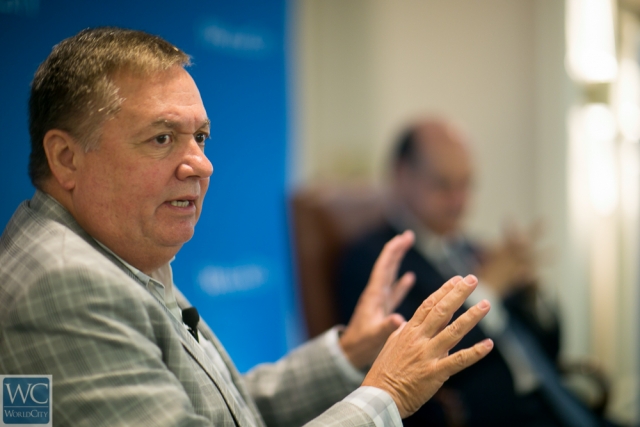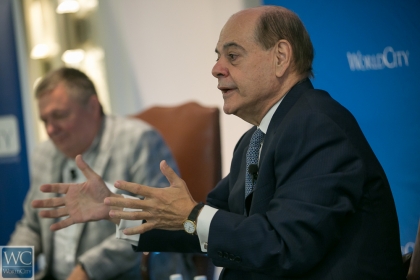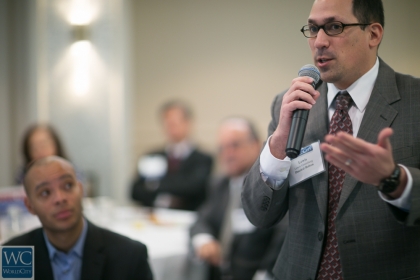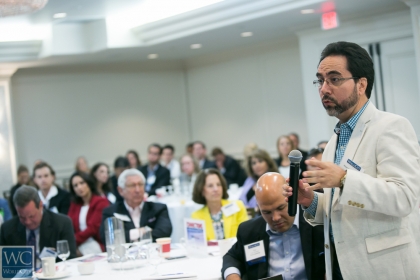Billion Dollar Bosses: Leading with style at Greenberg Traurig, Microsoft Latin America

Leaders who make it to the top have special qualities: vision, an ability to take risks and learn from mistakes, and a way of inspiring employees.
Add a disarming sense of humor and a willingness to share both personal and professional stories, and you’ve perfectly described Hernán Rincón of Microsoft, pictured above, and Cesar Alvarez of Greenberg Traurig. The two leaders headlined WorldCity’s Global Connections event April 24 titled “Billion Dollar Bosses: Secrets of their Success.”
Rincón, president of software maker Microsoft Latin America, earned his undergraduate degree in math and computer science. Alvarez, past CEO and current chairman of legal firm Greenberg Traurig, studied law. But despite different backgrounds – Rincón hails from Colombia, and Alvarez is the son of Cuban immigrants, their lessons on climbing the ladder are remarkably similar.

Cesar Alvarez of Greenberg Traurig
Both lead businesses with more than $1 billion in annual revenue.
Being a leader requires humility
After asking audience members to suggest words they associate with leadership -(innovation, vision, motivation, out-of-the-box and empathetic were some offered), WorldCity CEO Ken Roberts asked Rincón and Alvarez for their three-word descriptions.
“Trust, trust, trust,” said Alvarez. Beyond establishing that foundation, leaders also must figure out how to recognize and attract the best talent. And they must learn humility. Once at the top, CEOs may be surprised to realize that employees usually know far more about their particular area than do their superiors. “You have to be humble to accept that.”
Alvarez also internalized what might seem a contradiction: “I’ve learned the key to being CEO is to make as few decisions as possible.” Sometimes, he said, just waiting a day or two will see things resolve. “It’s important to let people in the firm make decisions at the level they should be made.”
It took a while to get to this stage, Alvarez acknowledged. “I was the ultimate supreme court.” But that changed, along with his sense of what his core role really entails. “I don’t consider myself the boss of anybody. I work for our lawyers.”
Any employee can call him – and even get him out of a meeting. He’s available for face-to-face discussions as well. And if an employee wants to meet, Alvarez says, “Great, I’ll be down in your office in a second,” underscoring that employees need not trek to an éminence grise. “It’s in the little things that people will understand that you are working for them.”
To rise, master new skills
Rincón, who first came to the United States as an exchange student, and later returned for college and graduate school, said that leaders need egos that can take constructive criticism. And they have to be willing to reach for skills that may not come so easily.
For Rincón, the challenge was integrating “soft skills” into his repertoire. He began fostering those abilities when, years ago, a peer review showed that his logical side almost always predominated.
“At that time, the concept of emotional intelligence wasn’t understood,” he said, noting that feedback for him touched on the need for more empathy, synchronicity and understanding another’s point of view.
“I’m still working on it,” Rincón said. “Some of these things are hard-coded and difficult to change.”
How to recognize talent, build culture
“What,” Roberts asked, “makes a good employee?”
The challenge for Microsoft, said Rincón, is not finding applicants. It’s making sure that candidates fit with the company’s culture that is focused on innovation in society.
“What makes a difference is passion,” Rincón said. “Are they working for a paycheck, or do they want to contribute?”
Greenberg Traurig recognizes that its lawyers can up and leave at any time. “You have to have something that binds you together,” Alvarez said. Having the right culture drives results, not the other way around.
Millennials and lessons from youth
How are the companies dealing with the millennial generation of workers? asked Lewis Greenberg (no relation to Greenberg Traurig), who heads up marketing at accounting firm Daszkal Bolton.
The question led to probably the most entertaining and enlightening part of the event, when both Alvarez and Rincón regaled the audience with tales of their own youth.

Lewis Greenberg, who heads up marketing at accounting firm Daszkal Bolton.
Rincón shared his experience as an exchange student in tiny Cantril, Iowa and how he parlayed that into a spot at a U.S. university. It was there he took independent study courses. “It taught me how to learn on your own – that process of being on your own totally changed my life,” he said. What stayed with him was that persistence pays off.
Alvarez told of horrifying his immigrant parents with the peace sign on his car. His point was that each generation discovers and creates its own manner of living and working.
“Somehow, somewhere my feeling is that there is a time when this generation will decide it’s ‘game time, and they have to bring the country forward,” Alvarez said.
How are their companies using social media?, asked Alejandro Alvarado, a consultant with Alvarado Communications.
Social media is among five technology trends driving virtually every workplace in every industry, said Rincón. The other four are: use of the cloud with its promise of almost unlimited capacity; mobility; Big Data and natural user interface.
The challenge, he said, is getting older workers to understand and embrace how the ever-more tech-savvy young generation thinks about the future. Rincón said Microsoft even has a reverse-mentoring program that teams up innovative newcomers with established workers.

Alejandro Alvarado, a consultant with Alvarado Communications.
Adopting technology means efficiencies for law firms, said Alvarez. During the economic downturn when some clients questioned the hourly billing system, the firm applied a project management paradigm to some issues and cases. “Technology is the only way to get efficiencies in order to get high quality at a lower cost,” he said.
Handling failure
Finally, questions turned to how to cope when things don’t go well. “What is your advice for having to start new?” asked Felix Murillo, a member of the International Business Development board member for the city of Doral.
Both executives said failure – and maybe lots of it – happened to every successful individual they had ever met.
“The success is in the getting up,” Alvarez said. “Failure is in your inability to get up again.”
Added Rincón, “There are market forces and company decisions that affect us all. The way to prepare for that is to be current in your skills. What is in demand? Get ahead of that.”
Global Connections is one of a five event series that media company WorldCity offers to brings together executives on international business topics. The Global series is sponsored by Florida International University College of Business and Edelman public relations firm.
The next Global Connections is scheduled for May 29 and will focus on media.